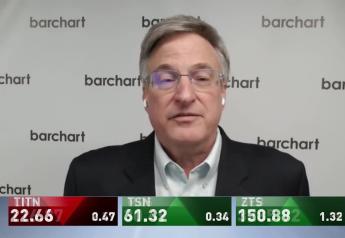Bayer Says Judge’s Ruling Won’t Affect Roundup Availability for Farmers
Roundup Proposal Rejected 052721
In response to a U.S. judge’s rejection of Bayer’s $2 billion class-action proposal, the company announced a five-point plan late Wednesday to address future claims.
In addition, Bayer addressed concerns of row-crop farmers who use Roundup (glyphosate) for weed control. The company says the decision will have no impact on the agricultural marketplace or Bayer’s commitment to Roundup or Roundup Ready for its farmer and retailer customers.
“We stand behind the availability and safety of glyphosate for farmers, and this won’t affect their ability to purchase or use it,” a Bayer spokesman told Farm Journal Thursday morning.
Glyphosate is the most used herbicide in the U.S., in terms of area treated. About 280 million pounds of glyphosate are applied to an average of 298 million acres of corn, soybeans and cotton annually, according to the Environmental Protection Agency (EPA).
Its relatively low cost and broad-spectrum weed-control benefits have historically made it a mainstay in farmers’ weed-control arsenal.
However, in recent years, ongoing weed resistance issues from overuse have impacted sales of the chemistry and spurred growers to include other technologies and cultural practices on their farm.
Recent lawsuits about the safety of the herbicide have also dogged Roundup/glyphosate. Bayer says studies over many decades have shown that Roundup and its main active ingredient, glyphosate, are safe for human use. The proposed class-action settlement was aimed at claims by people who said they were exposed to Roundup/glyphosate and then became sick years later.
Bayer says the court’s decision to reject its proposal closes the door on an MDL court-supervised national class solution to manage potential future litigation, which would have “been the fairest, most efficient mechanism for all parties.”
“Still, we have legal and commercial options that together will achieve a similar result in mitigating future litigation risk, and we will pursue them as quickly as possible,” the company said in a news release.
Last week, the EPA filed a brief with the U.S. Court of Appeals for the 9th Circuit in which it affirmed once again that glyphosate “poses no human-health risks of concern,” the release said.
The five-point plan Bayer developed includes:
1. Creation and promotion of a new website with scientific studies relevant to Roundup safety, and a request that EPA approves corresponding language on Roundup labels.
2. While the Company will remain in the residential lawn and garden market, it will immediately engage with partners to discuss the future of glyphosate-based products in the U.S. residential market, as the overwhelming majority of claimants in the Roundup litigation allege that they used Roundup Lawn and Garden products.
3. Future claims settlements and independent science advisory panel. The company will explore alternative solutions aimed at addressing potential future Roundup claims.
4. Ongoing efforts to settle existing claims will be reassessed. The company will continue to be open to settlement discussions, as long as claimants are qualified and resolutions can be reached on appropriate terms.
5. Continuing appeals. While not new actions, the appeals of the Hardeman and Pilliod cases will continue through the legal process and can also help manage future liability risk.
Bayer says it is confident that this new five-point plan of legal and commercial actions provides an effective path for the company to manage and address any risks from potential future Roundup litigation.
U.S. Judge Rejects Bayer's $2 Bln Deal to Resolve Future Roundup Lawsuits as 'Unreasonable'
U.S. Appeals Court Upholds $25 Million Roundup Verdict Against Bayer
|
|
Bayer Announces “Holistic Solution” For Roundup Case Resolution |







